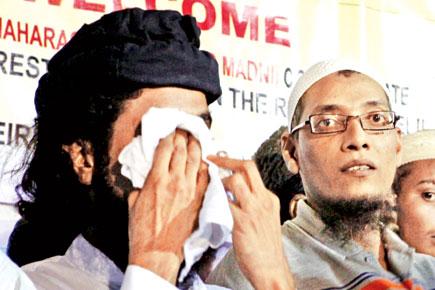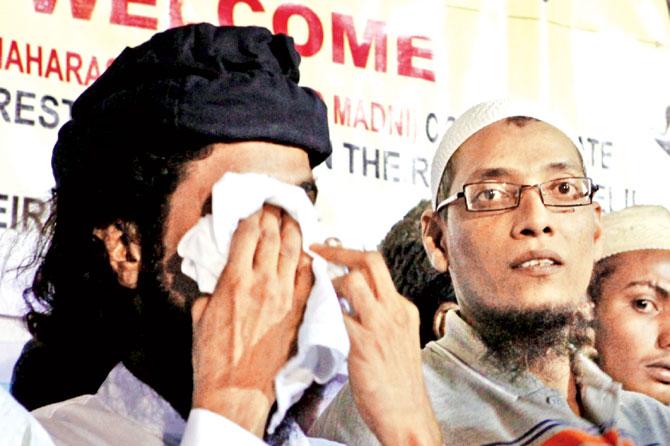Terrorism cases can be difficult to tackle, but maintaining a balance is necessary to ensure that all citizens can trust in the nation's justice

The 2006 Malegaon blasts accused react upon being realeased on bail in 2011 after spending nearly five years in jail. File pic
 The discharge of nine Muslim men on Monday for the Malegaon blasts case of 2006 comes as a blow to the Centre's counter-terrorism policy. In recent years, the government's counter-terror policy has taken strange twists and turns where those accused of serious lapses, including extra-judicial killings, have been let off on bail, and cases relating to terrorist acts being wilfully undermined by those very people who are supposed to prosecute the perpetrators.
The discharge of nine Muslim men on Monday for the Malegaon blasts case of 2006 comes as a blow to the Centre's counter-terrorism policy. In recent years, the government's counter-terror policy has taken strange twists and turns where those accused of serious lapses, including extra-judicial killings, have been let off on bail, and cases relating to terrorist acts being wilfully undermined by those very people who are supposed to prosecute the perpetrators.
ADVERTISEMENT
The Malegaon bombings were a series of blasts near a graveyard in September 2006 during the observance of Shab-e-barat, when Muslims visit the graves of their relatives. 37 people died and 125 were injured and subsequently — and somewhat improbably — nine Muslims were arrested. These men got bail in 2011 and in 2013, the National Investigation Agency (NIA) told the court that they had no evidence to link them to the blasts. Even then, it took two years for them to be finally discharged by the court on Monday, meanwhile one of the accused died some months ago in an accident.

The 2006 Malegaon blasts accused react upon being realeased on bail in 2011 after spending nearly five years in jail. File pic
There were a number of unexplained and unsolved bombings targeting Muslims in many small towns of Maharashtra between 2003-2008. Pharbani's Mohammidya Masjid was targeted in November 2003, Madrasa Meraj-Ul-Uloom in Purna and Qadiriya Mosque in Jalna in August 2004, Malegaon was targeted in 2006 and 2008, the second time around with Modasa in Gujarat. There were similar blasts elsewhere, too, where the targets were primarily Muslims — the Mecca Masjid blast of Hyderabad in May 2007, the twin blasts at the Jama Masjid in April 2006, the Ajmer Sharif blast in October 2007, and the Samjhauta Express bombing of February 2007.
After flawed investigations by the Maharashtra Anti-Terrorism Squad and the CBI, the NIA took up the cases and uncovered a deep conspiracy of some Hindutva elements who, in some instances, may have even been linked to the upper echelons of the RSS. Since the arrival of the BJP government in New Delhi, there has been a systematic effort to undermine the cases.
The senior public prosecutor in the Malegaon case, Rohini Salian was told to go soft in the case by senior NIA officers. Thereafter, she was removed as the prosecutor. The Ministry of Home Affairs officials being forced to ensure that Sharad Kumar, who had retired as DG of the NIA, would continue to supervise the case as a contract employee, is another pointer to the state of affairs. It is not too difficult to discern a parallel and systematic media campaign in favour of those accused in these cases in recent months.
Undermining investigation agencies is bad enough, but the bigger problem with the BJP government's policies is that it is undermining the fight against what Modi and his government themselves say is the biggest problem that India and the world confront — terrorism.
There can be no justification for terrorism — an act that deliberately targets innocent persons for political effect. But it would be foolish to ignore that certain actions can play into the hands of terrorists. Terrorist strikes are often motivated with the goal of deepening sectarian, religious and ethnic faultlines. But these divides can also be opened up by unaddressed grievances. Draconian sweeps picking up young Muslim men following terrorist strikes have been bad enough, but worse has been the conduct of some police forces who have sought to falsely implicate some of these people in terrorism cases. So far from tackling terrorism, such action actually create a pool of people who nurse a sense of grievance and are a standing target for terrorist recruiters.
The Muslims discharged in the Malegaon case spent five years in jail on what was clearly fabricated evidence. They are not the only innocents who have been caught up by crude police investigations which result in people being discharged after years in jail. In the Mecca Masjid case, more than 100 young Muslims were arrested and 21 of them suffered torture and prolonged incarceration before their unconditional release and four of them were acquitted for want of evidence in July 2014.
Mohammed Amir Khan, who was in jail for 14 years, was discharged without any conviction in the multiple cases he was charged with. He has related his story in his recent autobiography Framed as a terrorist. His story is typical — arrested, tortured, made to sign blank papers and having to defend himself against multiple cases foisted on him.
Terrorism cases are particularly difficult to prosecute. After all, those planning a terrorist act are hardened persons and take all the precautions to ensure they are not exposed. Because of widespread use of torture, courts do not accept confessions as evidence. Yet, there needs to be a balance between the powers of the police and the rights of someone accused of a crime as heinous as terrorism.
The balance is necessary if we are to convince the average Indian, which surely includes our Muslim fellow-citizens, that India is a country where the rule of law prevails, a just society which deserves the love and loyalty of its citizens.
The writer is a Distinguished Fellow, Observer Research Foundation, New Delhi
 Subscribe today by clicking the link and stay updated with the latest news!" Click here!
Subscribe today by clicking the link and stay updated with the latest news!" Click here!






